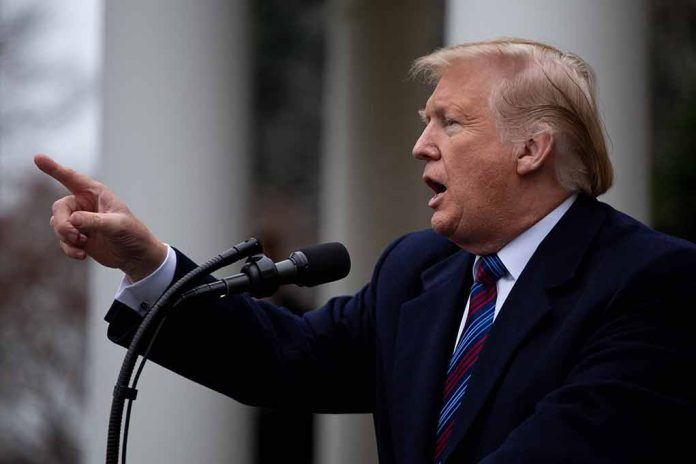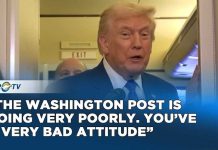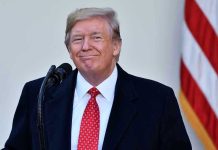
President Trump signed a bold executive order to slash drug prices by enabling states to import cheaper medications from Canada, targeting Big Pharma while overhauling Medicare’s drug negotiation process for American patients.
Key Takeaways
- President Trump’s April 15 executive order authorizes states to import lower-cost prescription drugs from Canada, with Florida already receiving approval.
- The order improves Medicare drug price negotiations, with lower prices for 10 medications set to begin January 1, 2026.
- FDA approval processes for generic and biosimilar medications will be streamlined, potentially reducing prices by up to 80%.
- Dr. Mehmet Oz is directed to further reduce insulin prices, potentially making insulin available to low-income patients for as little as 3 cents per vial.
- The administration is simultaneously investigating the national security implications of foreign pharmaceutical dependence, with possible tariffs on imported medicines.
Canadian Imports to Combat High Drug Prices
President Donald Trump’s new executive order aims to tackle the skyrocketing costs of prescription medications by enabling American states to import drugs from Canada. Signed on April 15, the order builds upon a framework established in 2020 under section 804 of the Food, Drug and Cosmetics Act, which requires FDA approval for such importation programs. Currently, Florida stands as the only state authorized to import Canadian pharmaceuticals, following a lengthy three-year approval process that the new order seeks to streamline.
The urgency behind this action is clear: Americans pay substantially more for medications than their northern neighbors. Analysis by the Kaiser Family Foundation found that U.S. per-capita prescription spending is 42% higher than in Canada. The executive order directs the FDA to improve the approval process and encourages more states to apply for authorization, potentially bringing significant relief to American consumers struggling with medication costs.
🚨 NEW: President Donald J. Trump just signed an Executive Order to expand on the historic efforts of his first term to lower prescription drug prices.
The Order directs the Department of Health and Human Services to take steps to significantly reduce drug prices for American…
— Rapid Response 47 (@RapidResponse47) April 15, 2025
Overhauling Medicare Drug Negotiations
A central component of the executive order revisits and enhances the Medicare drug negotiation program. This initiative will allow Medicare to directly negotiate prices with pharmaceutical companies, with initial lower prices for 10 commonly prescribed medications scheduled to take effect on January 1, 2026. Additionally, the order adjusts Medicare’s payment structure for prescription drugs to align more closely with actual supplier costs, addressing the current overpayment issues that have contributed to inflated prices.
“Today, President Donald J. Trump signed an Executive Order to expand on the historic efforts of his first term to lower prescription drug prices,” wrote The White House.
The order provides significant discounts on life-saving medications for low-income patients, with special emphasis on insulin and injectable epinephrine. Dr. Mehmet Oz has been specifically tasked with further reducing insulin prices, potentially allowing uninsured patients to receive insulin for as little as 3 cents per vial. This measure directly addresses one of the most critical medication affordability issues facing millions of Americans with diabetes.
Boosting Generic Competition and Supply Chain Transparency
To foster a more competitive pharmaceutical marketplace, the order directs regulators to expedite approvals for generic and biosimilar drugs. These alternatives typically cost 80% less than their brand-name counterparts, making their swift entry into the market crucial for driving down overall prescription costs. Furthermore, Health and Human Services Secretary Robert F. Kennedy Jr. has been instructed to collaborate with Congress on addressing the pharmaceutical industry’s focus on developing expensive large-molecule drugs rather than more affordable small-molecule alternatives.
“President Trump is dedicated to creating a transparent, competitive, and fair prescription drug market for American consumers,” said The White House.
The order also tackles opaque broker practices in the prescription drug supply chain, directing the Department of Labor to establish rules requiring disclosure of broker fees. This transparency initiative aims to eliminate conflicts of interest that often lead to higher prices for patients. By shedding light on these previously hidden costs, the administration hopes to reduce markups and ensure that patients receive medications at fair prices.
National Security Concerns and Domestic Production
Alongside measures to reduce costs, the Trump administration has initiated an investigation to determine if imports of medicines and pharmaceutical ingredients pose threats to national security. Using Section 232, a legal authority previously applied to industries like automobiles and lumber, the inquiry reflects President Trump’s concerns about America’s pharmaceutical manufacturing capacity.
“We don’t make our own drugs anymore,” Mr. Trump said. “The drug companies are in Ireland, and they’re in lots of other places, China.”
The president has indicated that pharmaceutical tariffs could come in the “not too distant future,” though experts caution that such measures might lead to higher prices and potential shortages of critical medications. While the administration aims to shift production back to the United States, analysts note that tariffs alone may be insufficient to achieve this goal given the substantial costs and time required to relocate manufacturing facilities and supply chains.
Sources:
- Trump’s Tariff Threat for Drug imports Poses Big Political Risks – The New York Times
- Trump signs healthcare executive order that includes a win for pharma companies | Reuters
- Fact Sheet: President Donald J. Trump Announces Actions to Lower Prescription Drug Prices














